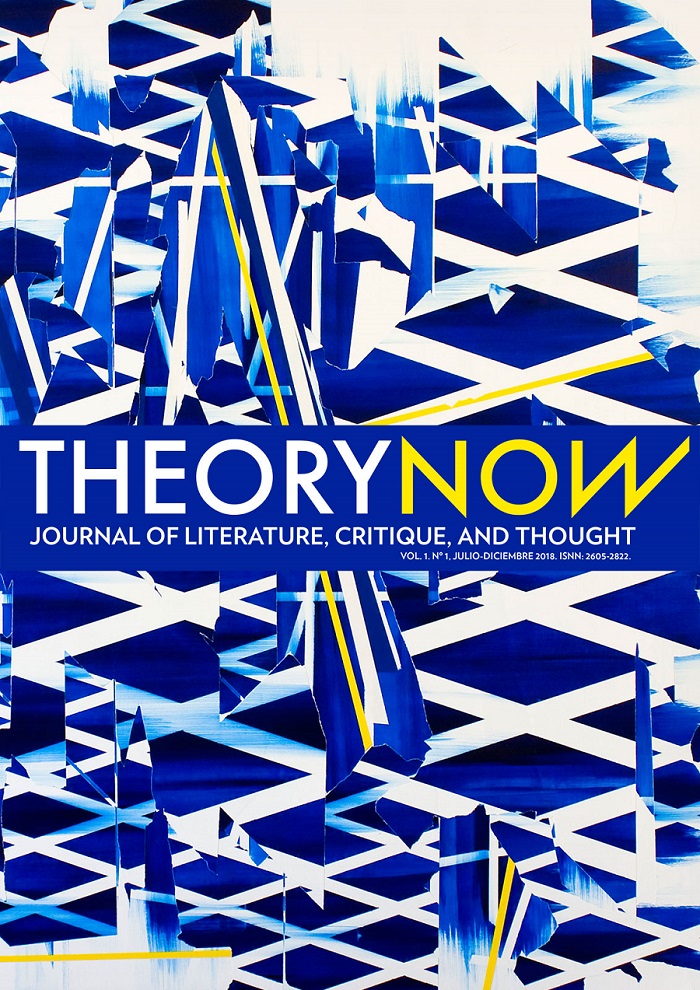Jonathan Culler: theory, literature and posibility of critique
DOI:
https://doi.org/10.30827/tnj.v1i1.7597Keywords:
Critique, Repetition, Différance, Performativity, Derrida, BadiouAbstract
The present paper examines the way in which Jonathan Culler approaches the problem of the possibility of critique as well as the role of literature in fulfilling this possibility in the postmodern context of questioning of truth. Special attention will be paid to the trilogy composed by Literary Theory. A Very Short Introduction (1997), The Literary in Theory (2007), and Theory of the Lyric (2015). In these works, Culler proposes a return to the literary whilst keeping in touch with the contributions of theory. Culler argues for literature’s ability of staying away from the determinants of ideology. In so doing, Culler mobilizes the heritage of aesthetics—the notion of imagination as free play of the determinants of material circumstances and the idea of reconciliation of the particular and the universal—, as well as the legacy of the linguistic turn. The scope of the possibility of critique will be analyzed by comparing the general Derridean textuality subscribed by Culler with the idea of “idéalinguisterie”, a neologism coined by Alain Badiou to refer to the reduction of any reality into discourse. Finally, we will argue that the lack of a strong theory of truth prevents Culler from going beyond the possibility of escaping from ideology.Downloads
References
Badiou, Alain. Para unha nova teoría do suxeito. Santiago de Compostela, Noitarenga, 2000.
____. Theory of the Subject. London, Continuum, 2009.
Culler, Jonathan. Structuralist Poetics. Structuralism, linguistics and the study of literature. London, Routledge & Kegan Paul, 1975.
____. Saussure. Glasgow, Fontana, 1976.
____. On Deconstruction. Theory and Criticism after Structuralism. London, Routledge & Kegan Paul, 1983.
____.. “Literary Theory”. Introduction to Scholarship in Modern Languages and Literatures, Joseph Gibaldi (ed.), Modern Language Association, 1992, pp. 201-35.
____. Literary Theory. A very Short Introduction. Oxford, OUP, 1997.
____.. The Literary in Theory. Stanford, California, Stanford University Press, 2007.
____. Theory of the Lyric. Cambridge, Massachusetts, Harvard University Press, 2015.
Derrida, Jacques. Acts of Literature. New York and London, Routledge, 1992.
____. Specters of Marx. New York and London, Routledge, 1994.
Eagleton, Terry. Trouble with Strangers. Oxford, Wiley-Blackwell, 2009.
____. The Event of Literature. New Haven and London, Yale University Press, 2012.
____. “The Return of the Aesthetic”. The Politics of Pleasure, Stephen Regan (ed.), Buckingham, Philadelphia, Open University Press, 1992, pp. 17-31.
Martínez Marzoa, Fernando. Desconocida raíz común. Barcelona, Visor, 1987.
Norris, Christopher. “Deconstruction: Modern or Postmodern?”. Modernism, Modernity, Postmodernism, Manuel Barbeito (ed.), Servicio de Publicaciones USC, 2000, pp. 45-92.
____. The Winnowing Fan. Verse-Essays in Creative Criticism. London, Bloomsbury, 2017.
Saghafi, Kas. Apparitions—Of Derrida’s Other. New York, Fordham University Press, 2010.
Downloads
Published
How to Cite
Issue
Section
License
Theory Now. Journal of Literature, Critique, and Thought is an immediate open-access publication which is available at no cost for readers and authors alike. Authors are not charged any kind of fee for the editorial processing of their articles. Reading, downloading, copying, distributing, printing, searching, linking or reusing all published articles for non-commercial uses is allowed on the condition of citing the author, the journal and the editing body. All intellectual material published in this journal is protected under a Creative Commons Attribution-NonCommercial 3.0 Spain license.
Dissemination of the articles in social (Facebook, Twitter, Linkedin, etc.) and scientific networks (ResearchGate, Academia.edu, etc.), public repositories at universities and other institutions, blogs, personal or institutional websites, Google Scholar, ORCID, ResearchID, ScopusID, etc. is strongly encouraged. In all cases, the intellectual property of the articles and any possible monetary profits derived from them belong exclusively to the authors.













